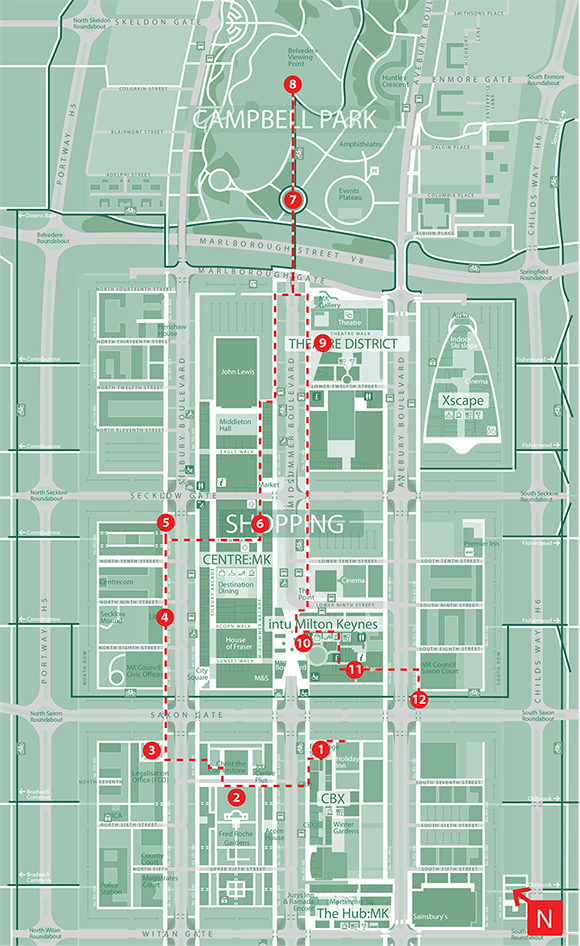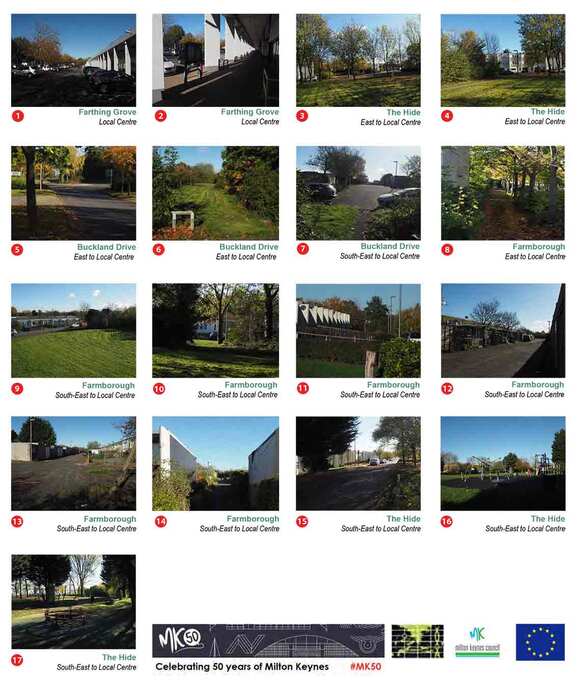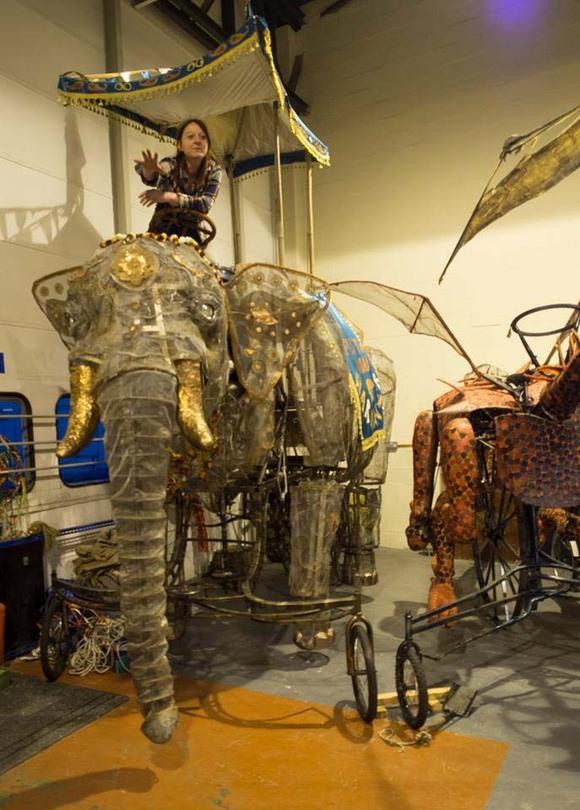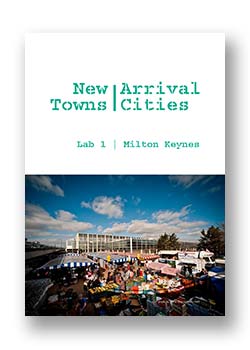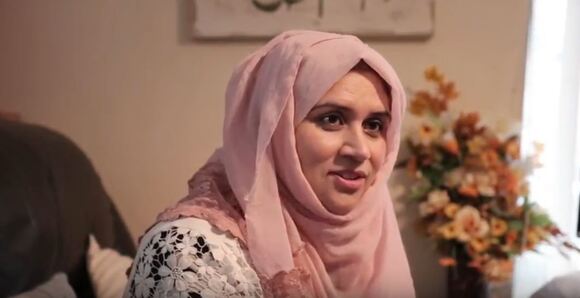(Open to participants of EU Partner Cities)
10.30 City Centre Walking Tour
(Departure from Holiday Inn, Central Milton Keynes)
Tim Skelton (MK Forum) will lead a Public Art walking tour of the city centre highlighting the key pieces of public art and their importance to Milton Keynes. He will talk about the importance of these pieces in building a sense of place and identity within new communities from the city’s early days to the more ‘corporate’ pieces added to the city centre in the 1980s and 1990s. Milton Keynes’s more than 230 public art pieces have been recently recognized as a collection in its own right, enabling it to be regarded as one of the key ‘framework’ attributes that gives Milton Keynes its character, and placing greater emphasis on how works should be commissioned in the future.
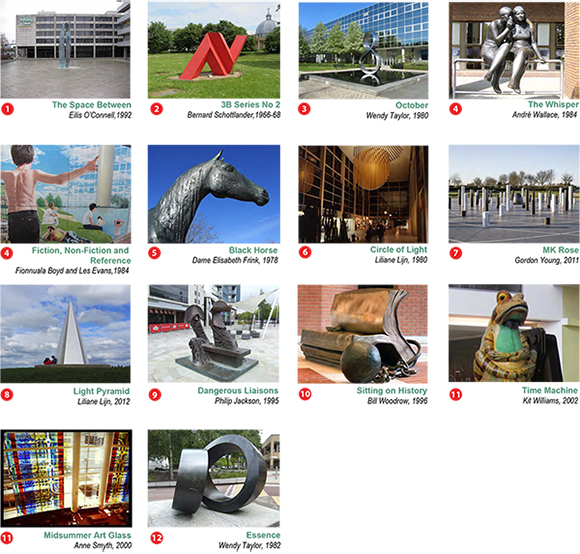
12.00 Welcome and Orientation
(Location: Saxon Court)
Shane Downer (MK Council) and Noel James (MK City Discovery Centre) welcome the EU E4C partners to Milton Keynes to go through tour programme.
12.30 Interaction 1: Community Language Service
(Location: Saxon Court)
Anne-Marie Brown from the MK Community Language Service will discuss how interpreters and translators are used in Milton Keynes and the diversity of the communities they serve. Today, over 60 languages are represented to meet the needs of the different influxes of people from across the globe who come to make Milton Keynes their home.
13.30 Interaction 2: Milton Keynes Islamic Arts, Heritage and Culture (MKIAHC)
(Location: Milton Keynes College, Leadenhall Campus)
During Lunch, Anouar Kassim (MKIAHC) discusses the group’s ongoing initiatives in bringing together a range of different ethnic community groups in positive dialogue and activity against a current backdrop of anti-immigration attitudes locally and nationally. Successful initiatives include the work with the police, schools and colleges, and the annual major city-centre ‘Art in the Park’ event which attracts almost 10,000 people annually.
14.15 Loop 2: Netherfield Tour
(Departure from the Netherfield Local Centre)
Simon Jackson (local architect) will lead us on a short walking tour of Netherfield, highlighting its original design, the diverse communities that live there and the issues and challenges facing it today. He will describe its physical decline and the arrival of poorer residents, the rise of absentee landlords and the resulting lack of motivation. Simon will also discuss the proposed regeneration process.
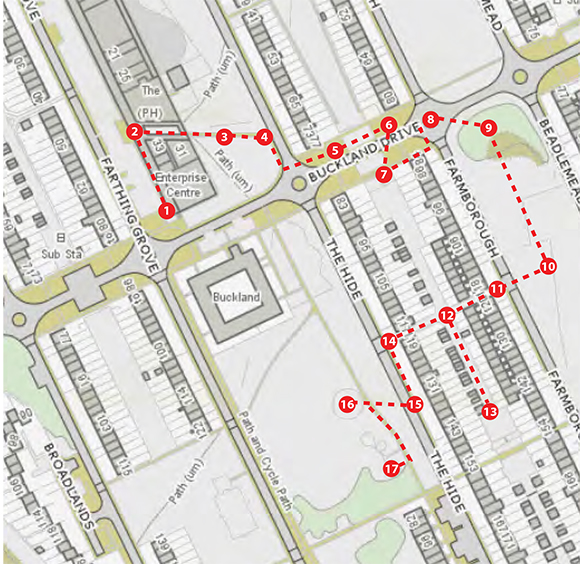
15.00 Interaction 3: Netherfield Exhibition
(Location: Milton Keynes City Discovery Centre at Bradwell Abbey)
Darren Umney (PhD candidate in Design) presents his academic arts project, ‘Every House of Langland Road’, which is displayed as a major exhibition at the MK Gallery. The project proposes design concepts for Netherfield, a culturally diverse New Town area faced with poverty and health issues which is the subject of regeneration plans. Introduction by Noel James.
16.00 Interaction 4: Festive Road
(Location: Festive Road CIC at Kiln Farm)
Jessica Rost (Director of Festive Road) talks about the work of Festive Road in carnival and festival fringe arts, how they engage with diverse groups across MK and help new and existing peoples form an identity and sense of place and belonging. The presentation is followed by a tour of their Kiln Farm HQ (original factory unit).
16.45 Loop 3: MK Museum Tour
Bill Griffiths (Director of a ‘MK Museum Victorian Christmas’) leads a tour through the MK Museum. The museum is set in a Victorian Model Farm dating from 1847 and part of the development of nearby Wolverton, the world’s first planned railway town. Atmospherically lit by lamp and candlelight, the tour will include the special rooms, collections and stories, ending at the Granary Tea Room.
17.30 Interaction 5: Creation of the MK Museum
(Location: MK Museum)
Bill Griffiths talks about the creation of MK Museum from volunteer heritage community roots in 1973 and its evolution over 40 years into the new City Museum to open in 2019.
18.00 Christmas Buffet Meal, with discussion and feedback
(Location: MK Museum)
(Open for the public)
(Location: Holiday Inn Central, 500, Saxon Gate, Milton Keynes)
09.00 Introduction: Welcome to Milton Keynes – Culture, Migration and Identity
Francesca Skelton (Chair of the MK Arts and Heritage Alliance, Moderator for the day) and Liz Grifford (Cabinet Member for Place) give an introductory presentation.
Part one: Beginnings
09.15 ‘Europe for Citizens Project Overview’
Presented by Michelle Provoost (Director of the International New Town Institute)
09.25 ‘Towards 2050 - Milton Keynes: The Cultured and Creative City’
Presented by Shane Downer (MK Heritage Officer)
09.35 Keynote Presentation: ‘Does a more diverse new city mean a more unsettled city? Milton Keynes since 2000’
Presented by Professor Mark Clapson (University of Westminster)
10.05 Panel Discussion
Participants: Michelle Provoost, Shane Downer, Mark Clapson, Liz Grifford
10.45 Break
Part Two: The Makings of Milton Keynes
11.15 ‘A City Designed for Migration?’
Presented by Will Cousins (Chair of MK Gallery)
11.35 ‘Personal Stories: Creating the Cultural Ambassadors of the future’
Presented by the students of the MK Academy. Introduction by Deborah Gockelen (Director of Business and Enterprise)
11.55 ‘Reaching newcomers, migrants & refugees through Culture’
Presented by Mike Kasibo (Chair and Founder of the Global Outreach Foundation)
12.15 Panel Discussion
Participants: Will Cousins, Deborah Gockelen and MK Academy students, Mike Kasibo, Rosaline Stafford (Director of Global Outreach Foundation Milton Keynes - GOF:MK)
13.00 Lunch
Part Three: Placemaking and City Identity
14.00 ‘Different by Design: Milton Keynes the European Capital of Culture 2023? The role of Identity and Diversity in the draft 2023 Programme’
Presented by Fiona Boundy (Public Art Officer, Milton Keynes Council)
14.20 ‘Plan: MK – building culture and identity into the next Local Plan’
Presented by Mike Moore (Senior Planning, Milton Keynes Council)
14.40 ‘The significance of Milton Keynes’s Design Unique Selling Point – The New Town Heritage Register’
Presented by Simon Peart (Conservation and Archaeology Manager, Milton Keynes Council)
15.00 ‘When New Towns are no longer new, Migration, Identity and Regeneration of the original New Town area’
Presented by David Gleeson (Managing Director of Your:MK)
15.20 Break
15.40 Panel Discussion
Participants: Fiona Boundy, Mike Moore, Simon Peart, David Gleeson, Roger Kitchen (Founder of Living Archive), Anouar Kassim (Founder of MK Islamic Arts Heritage and Culture / Community Connects UK)
16.20 Summary and concluding discussion
18.15 Dinner for participants of EU Partner Cities
(Location: Brown’s Restaurant)
Including entertainment from Festive Road
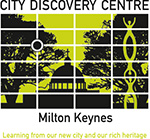
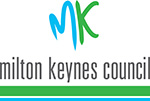
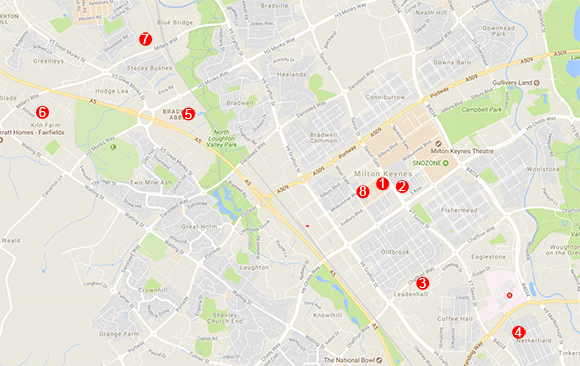
Day 1
10.30 City Centre Walking Tour
[1] Holiday Inn Central
(500, Saxon Gate, Milton Keynes, MK9 2HQ)
12.00 Welcome and Orientation, Interaction 1
[2] Saxon Court, Milton Keynes Council
(502 Avebury Boulevard, Milton Keynes MK9 3HS)
13.30 Interaction 2
[3] Milton Keynes College, Chaffron Way Campus
(Woughton Campus West, Leadenhall, Milton Keynes MK6 5LP)
14.15 Netherfield Tour
[4] The Local Centre
(Farthing Grove, Netherfield, Milton Keynes, MK6 4JH)
15.00 Interaction 3
[5] Milton Keynes City Discovery Centre at Bradwell Abbey
(Alston Dr, Milton Keynes MK13 9AP)
16.00 Interaction 4
[6] Festive Road CIC
(28 Burners Lane Kiln Farm Milton Keynes MK11 3HB)
16.45 MK Museum Tour, Interaction 5 and buffer meal
[7] MK Museum
(McConnell Dr, Wolverton, Milton Keynes MK12 5EL)
Day 2
Seminars beginning at 9.00
[1] Holiday Inn Central
(500 Saxon Gate, Milton Keynes MK9 2HQ)
18.30 Dinner
[8] Browns Restaurant, The Hub
(300 Midsummer Blvd, Milton Keynes MK9 2EA)
The main event location is:
Holiday Inn Central
500 Saxon Gate, Milton Keynes MK9 2HQ
By Air
Milton Keynes is easily served by a number of airports. London Luton is just a 30 minute drive away, whilst both London Heathrow and Birmingham International are around one hour away.
By Train
Access to Milton Keynes by train is very easy. There is a main rail station in Central Milton Keynes. The station is served by the West Coast Mainline which runs from London, Euston (just 35 minutes away) through MK to Birmingham and on to Manchester and then Scotland. Two services operate from the station: London Midland and Virgin Trains. For more information on train times visit http://www.nationalrail.co.uk/stations_destinations/MKC.aspx
From Milton Keynes Rail Station, any bus service from stops Y1 or Y2 can be used to travel to the Holiday Inn (bus stop: Central Business Exchange). These busses run every few minutes, and the journey time is approximately five minutes.
By Bus
Milton Keynes has a comprehensive bus service. For further information visit www.arriva.co.uk For example, from Luton airport Bus line 99 runs once an hour to Central Milton Keynes. From there, Central Milton Keynes is served by a network of frequent bus services from all parts of the city. There is as bus stop at the Central Business Exchange, just outside the Holiday Inn.
Accommodation:
To find accomendation please visit http://www.destinationmiltonkeynes.co.uk/Where-to-stay
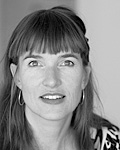
Michelle Provoost (Director of the International New Town Institute)
Dr. Michelle Provoost is an architectural historian specialised in urban planning history, postwar architecture and contemporary urban development. She co-founded the office of Crimson Architectural Historians in 1994, and has been the Director of the International New Town Institute (INTI) in Rotterdam, the Netherlands, since 2008. Under her direction, INTI has grown into an internationally known center for education and research relating to New Towns.
Dr. Provoost is the head editor of the INTI publications. She teaches at various universities in the Netherlands and abroad and continues to be in great demand as a public speaker. She lectures regularly throughout Europe, Asia, Africa and the United States, and has been involved in many municipal, national and private committees and juries.

Shane Downer (Heritage Officer, Milton Keynes Council)
Shane Downer has been Milton-Keynes’ Heritage Officer since 2003, coordinating the strategic heritage programme in Milton Keynes. Through these Strategic Plans he works with colleagues and local, regional and national public, private and third sector partners to implement major heritage provision change for a current resident population of 260,000 and over 200,000 heritage visitors a year to the six major heritage venues.
As Milton Keynes is set to almost double in population over the next thirty years, Shane coordinates the major building projects around new heritage, archive and museum provision including a new city Museum for 2019 a new City Archive and city centre cultural showcase for 2021, and refurbishment of other heritage sites. 2017 has been ‘MK’s’ 50th anniversary and he is part of a team planning cultural step-change and a bid for Milton Keynes to be the UK’s European Capital of Culture in 2023.
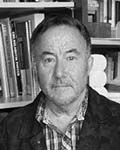
Mark Clapson (Professor at University of Westminster)
Mark Clapson is Professor of Social and Urban History at the University of Westminster. He has written A Social History of Milton Keynes: Middle England/Edge City (2004) and co-authored, with Mervyn Dobbin and Peter Waterman, The Best Laid Plans: Milton Keynes since 1967 (1998)

Will Cousins (DipARCH DipUD RIBA, Design Director, Chair of MK Gallery)
Will is a qualified Architect and Urban Designer with considerable experience of working in both the private and public sector on large scale strategic projects. He has been a Director at David Lock Associates since 1991 and has been personally responsible for the management and leadership of several of the Company’s major commissions.
Before joining DLA, Will worked for London Docklands Development Corporation leading the Urban Design work of the Wapping and Limehouse Area Team, managing and delivering waterside regeneration and infrastructure projects during a time of intense development activity. Prior to that he worked on the implementation of the Master Plan for Milton Keynes Development Corporation and was responsible for the preparation of several master plans for new neighbourhoods, including proposals for the innovative Energy Park.
In addition to his position at DLA, Will is a Director of DLA Architects Practice Ltd; he is also a Founding Director of David Lock Associates (Australia Pty) with offices in Melbourne and Sydney, and regularly contributes to the Australian Practice’s master planning work. Outside of the office, Will is Chair of Milton Keynes Gallery.
MK Academy Cultural Ambassadors, with Deborah Gockelen (Director of Business and Enterprise) Milton Keynes Academy)
The MKA Cultural Ambassadors are a group of students representing Years 8 upwards who came together in June 2017 to explore cultural opportunities in Milton Keynes, to research attitudes to their city and to promote their ideas about what makes MK so special.
The students have conducted research in the school and the local community, have ‘Taken Over’ Milton Keynes Museum, attended performances of ‘ Home Sweet Home’ and ‘Our Town’ and taken part in a workshop to provide a cultural map of Milton Keynes reflecting their views now and how they wish to see MK in the future. They wish to share their research and their vision for MK’s development with you on the 23rd November!

Mike Kasibo (Chair and Founder of the Global Outreach Foundation Milton Keynes - GOF:MK)
Mike Kasibo is the founder and Chair of Global Outreach Foundation MK. Mike is also the co-founder of African Diaspora Day Event and the initiator of Build In First Concept. Mike is currently undertaking his MSc in Global Cooperation and Security from Birmingham University. Mike has a BSc (Hons) Social work and Applied social studies from the University of Bedfordshire. He also has a diploma in Business Communication and a certificate in Community Organising. With over eight years’ experience in Social care, police and Community organising, Mike has contributed to the programmes geared towards the integration of refugee and migrant communities in East and West Midlands, through activities, events and skills development such as power analysis mapping, Leadership Training, Connecting, Speaking Out, Building Power and Mentoring. (Activities and events includes; African Diaspora Day Event, Black History Month, African Forum, Youth clubs, Show Racism Red Card and Breakfast Club)

Fiona Boundy (Public Art Officer, Milton Keynes Council)
Fiona Boundy is a freelance curator and creative producer who for the last eight years has specialised in the development and delivery of large-scale public realm commissions.
Past projects include delivery of Artlands North Kent, an award-winning public realm programme, which formed part of Parklands - Farrells green infrastructure scheme for the Thames Gateway; curation and delivery of a two-year programme of artists and makers residencies in the Olympic Park for the London Legacy Development Corporation; the delivery of Greenland Street, Liverpool – a temporary art space which delivered a three-year programme of major new commissions in the lead up to Liverpool Capital of Culture and led on the development of a strategic plan for the Baltic Triangle, Liverpool’s new creative quarter, and a series of six public realm commissions in Athens, as part of the launch of a major new cultural hub.
Fiona works as part of the Economy and Culture team at MKC, working on the development of a number of public art commissions, alongside strategic cultural futures projects including Milton Keynes bid to become European Capital of Culture and the new future cultural model for the city.
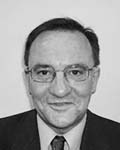
Mike Moore (Senior Planning, Milton Keynes Council)
Michael Moore is a Chartered Town Planner in the Planning Department of Milton Keynes Council. He has worked on several plans for the development of Milton Keynes over the years and is currently working on a new Local Plan (Plan:MK) for the development of Milton Keynes up to 2031. Michael’s work in producing planning policies and related planning obligations guidance has been used by the Council to secure major financial contributions for the infrastructure and facilities made necessary by new development. While at the Council, Michael has worked on regeneration initiatives and prepared and managed external funding bids, including an EU funded project for the development of an Arts and Craft centre within the city. Michael is a graduate of the University of East Anglia and his work on planning obligations and the MK Tariff was the subject of his Master’s degree thesis. He is a former director of the East of England Tourist Board.

Simon Peart (Conservation and Archaeology Manager, Milton Keynes Council)
Simon has been Milton Keynes Council’s Conservation & Archaeology Manager since 2006. Simon is responsible for advising the Council, Stakeholders, commercial organisations and the wider public on the rich and varied heritage of Milton Keynes, which ranges from historic market towns through Victorian railway works, the WWII code breaking at Bletchley Park to its unique, late C20 new town. This advice is given at both a strategic level, helping to encourage sustainable growth, and at a detailed level on specific development proposals affecting heritage assets.
Simon is the project manager of Milton Keynes’ New Town Heritage Register, a ‘local list’ focused specifically on the Development Corporation period of the new town. The register seeks to recognise the unique character and heritage value of Milton Keynes, increasing awareness and appreciation, ensuring that it informs important decisions about its future and, where appropriate, that it is preserved for the enjoyment and education of future generations.

David Gleeson (Managing Director of Your:MK)
With more than 25 years’ experience, David has worked on complex and high profile housing development and regeneration schemes across London and the South East. He has delivered innovative and community centred programmes in Hackney, Tower Hamlets, Camden, Westminster and Surrey. David, as Managing Director of Your: MK, is responsible for directing the company to achieve its objectives. He currently lives in Bedfordshire with his family.
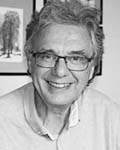
Roger Kitchen (Founder of Living Archive)
Roger joined the Development Corporation’s Social Development Dept. in 1971 as a community worker on the first new housing estates. In 1975 he came ‘inside’ the Social Development Dept., specialising in Education and Youth Liaison helping in the establishment of Inter-Action, the Youth Information Service and the Urban Studies Centre (now the City Discovery Centre). In 1978 he became the co-Director and later Director of Inter-Action Milton Keynes. In 1992 he left to become General Manager of Living Archive Milton Keynes, an organisation he’d co-founded with Roy Nevitt in 1984.
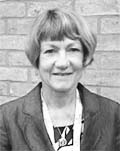
Cllr. Liz Gifford (Cabinet Member for Place, Milton Keynes Council)
Cllr Liz Gifford is one of the two Labour councillors in Stony Stratford Ward which includes the areas of Stony Stratford, Fullers Slade, Galley Hill, Calverton and Crownhill. She is the Cabinet Member responsible for Place, and her Portfolio includes Strategic Planning, Economic Development, Business Growth, Transport, Culture, Skills, Parish Partnerships, Libraries, Leisure Centres and Community Assets and Events.

Anouar Kassim (Founder of MK Islamic Arts Heritage and Culture / Community Connects UK)
Anouar is founder and chair of the Milton Keynes Islamic Arts, Heritage and Culture group and has been instrumental in bringing diverse groups and communities together across all nations and faiths to raise the profile and importance of culture to creating social inclusion, acceptance and an identity of belonging to the city. Key successes include the work with the Police, Schools and Colleges and the annual major city centre ‘Art in the Park’ event which attracts almost 10,000 people annually.
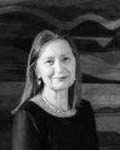
Francesca Skelton (Chair, MK Arts and Heritage Alliance)
Francesca moved to Milton Keynes in 1977 and spent the first 14 years commuting to London, first working on the commercial side of The Guardian newspaper, later moving over to IPC magazines where she worked on the launch of a new women’s magazine OPTIONS. She later became publisher of Ideal Home magazine. On the birth of her second child she decided to work locally and she moved from the private sector to work in the voluntary sector, where she managed Relate MK for ten years. The community of Milton Keynes became her focus and she later became a trustee of the Milton Keynes Community Foundation, where she also served a three year term as Chair. She joined the Board of Governors at MK College and served as Chair for six years from 2007- 2013.
She is a Deputy Lieutenant of Buckinghamshire and was High Sheriff of Buckinghamshire 2015/16. In 2016 she took on the role of Chair of the Arts and Heritage Alliance Milton Keynes, which has 39 members. AHA-MK champions the rich heritage and creative future of Milton Keynes and 2017 is an important year for arts and heritage as Milton Keynes submits its bid to be chosen as European Capital of Culture 2023. Thriving culture is the key to successful cities as investment in arts and heritage has a significant impact on the economy, skills, education, recruitment and retention, tourism, integration, mental and physical health and our overall wellbeing.

Noël James (Milton Keynes City Discovery Centre)
Noël James is the current Director and CEO of the Milton Keynes City Discovery Centre. She comes from a research background, and has over 25 years’ experience working in the heritage sector. She has a particular interest in the built environment and has recently left post as Director of the Historic Towns Forum, an umbrella organisation specialising in urban planning in historic towns. Noël gained her Doctorate in Medieval Law from the University of York in 1999, and has published widely on Medieval Law, Landscape History, Social History and Historical Geography. In the past she has held posts at the Prince’s Trust, the Heritage Lottery Fund, the Policy and Public Affairs Directorate at a Regional Development Agency, and at the Living Archive. She is an Academician of the Academy of Urbanism, a recent Trustee for the Battlefields Trust, and has been an expert panel member on the Revive & Thrive Challenge. She is also a mentor for the British Legion, mentoring returners to the built environment.
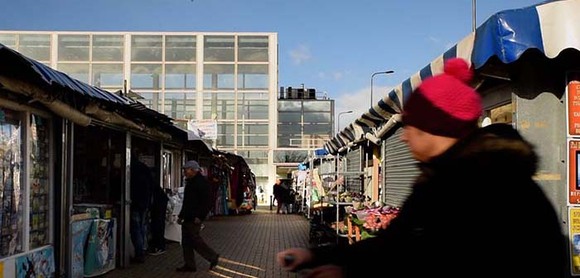
The refugee crisis has fuelled a global debate about migration. Taking a broader view, the New Towns Arrival Cities project focusses on migrants in general. European New Towns, at first composed entirely of newcomers, demonstrate how cities planned by the welfare state for homogeneous populations are adapting to increasing diversity. The two-day New Town Lab in Milton Keynes was the first of five labs that aim to address the topic of New Towns and migration and focussed on culture as its main theme. What is the main obstacle to integration, and how is it being addressed in Milton Keynes? INTI’s conclusions from the Lab, elaborated in the five main topics below, show that integration essentially requires recognizing newcomers as valuable members of the community, as opposed to an “us” versus “them” narrative.
Art and culture: Events provide a platform for dialogue and expression
“To be able to integrate, young people first need to understand who they are”
(Mike Kasibo, Founder of the Global Outreach Foundation: Milton Keynes)
If migrant communities are to be recognized and valued, they need to be known and understood. One of the challenges, for instance, is that many African youth are ashamed of their cultural roots because of the poverty portrayed on television. As well, there is a general lack of knowledge about their own cultural traditions. The African Diaspora Day, organized by the Global Outreach Foundation (GOF:MK), educates about African culture with food, music and local art. The annual Art in the Park festival, organized by the Milton Keynes Islamic Arts and Culture Organization (MKIAC), brings together multiple groups including the Islamic, Jewish and Sikh communities. Such initiatives are supported by the city.
Public space: A place where communities can meet and become visible
“The success of the city centre comes at the expense of social facilities”
(Mark Clapson, Professor of Social and Urban History at the University of Westminster)
With increasing population density and the privatization and commercialization of public spaces, there is a general lack of unprogrammed, neutral spaces that could give (migrant) communities a place to meet. The Town Centre for instance, originally planned as a bright and open public meeting place, has since become a private shopping mall that closes in the evening. The parks are almost the only remaining neutral public spaces, and some have become the hang-out places of troubled youth who have nowhere else to go. As neighbourhoods densify, it becomes increasingly important to provide social facilities such as community centres, youth centres, and neutral outdoor public spaces. Recognizing that the welfare state’s budgets for such facilities have largely disappeared, a partnership approach may be needed to offset the pressures on the public funds to meet these requirements.
Adapting the welfare state model: changing demands for housing and transportation
“The problem with regeneration is that it’s seen in architectural terms. The problem is actually poverty.”
(Roger Kitchen, Founder of Living Archive)
The Milton Keynes Development Corporation had a strong vision for Milton Keynes as a green city with a robust street grid, high-quality housing and social services. However, the car-oriented transportation network proved to be insufficient, and neighbourhoods are stricken with poverty. Those without a car, either because they are too young or cannot afford it, cannot easily move from place to place; there is no tram, and busses stop running after 21:00. In poor “grid square” neighbourhoods such as Netherfield and Fishermead, private sector renting has contributed to transient tenancy, posing an obstacle to forming stable communities. To address these social problems, regeneration efforts need to place greater emphasis on safeguarding support structures than on physical renewal.
Building a positive narrative: Understanding cultural differences
“I don’t know what to say to these people, because I don’t want to offend them.”
(GOF:MK Breakfast Club attendee)
Cultural differences and misunderstandings are a major obstacle to recognizing and accommodating migrant communities. For instance, the African custom of showing respect by avoiding eye contact and speaking softly is seen as disrespectful in the English context. Another example is Islamic women who, for religious reasons, need a separate swimming pool from men, but are told to use the general pool for cultural reasons of equality. The brochure picture of Milton Keynes for attracting newcomers has not yet caught up with the city’s cultural diversity, still portraying the ideal of suburban living with a townhouse, garden, car, and a white nuclear family. Working towards integration includes initiatives such as GOF:MK and the Great Linford Parish Council’s “Breakfast Club”, a regular meeting with guest speakers where all inhabitants are invited for breakfast and a discussion about cultural issues that affect their communities.
Government-citizen relations: Building trust is the key to establishing a dialogue
“Until people tell us what they want and what’s important to them, we can’t incorporate it into future plans.”
(David Gleeson, Managing Director of Your:MK)
Establishing trust between the municipality and the citizens is key for allowing community members to make their voices heard. Challenges in this regard are the municipality’s position of power, instances of not having delivered on promises, and neighbourhood organizations (so-called “parishes”) whose predominantly white and elderly members are not representative of their diverse communities. The strategy used by the Milton Keynes Council to reach out to various ethnic communities is to use private organizations such as MKIAC, which organizes events and school programmes, and GOF:MK which organizes, among other things, a platform for dialogue between the MK Police and African communities. While this strategy has proven effective in involving migrants in community life, it could introduce a potentially problematic blurring of religious interests and public services.
What are the next steps?
A more in-depth report of the Milton Keynes Lab will be published at the beginning of the new year. The New Towns Arrival Cities project will then continue with New Town Labs in Sabaudia (Italy) in May 2018, Grand Paris Sud (France) in October 2018, Vällingby (Sweden) in December 2018, and Nissewaard (The Netherlands) in February 2019. Thank you to the local partners and to all the international delegates who attended (pictured below)!
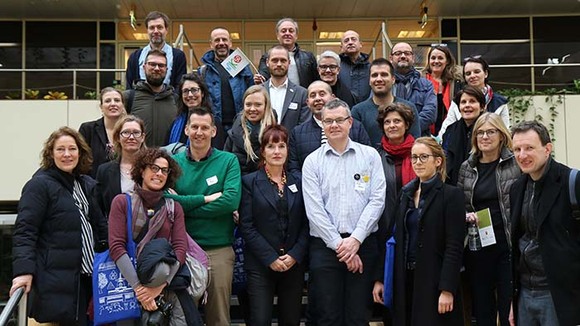
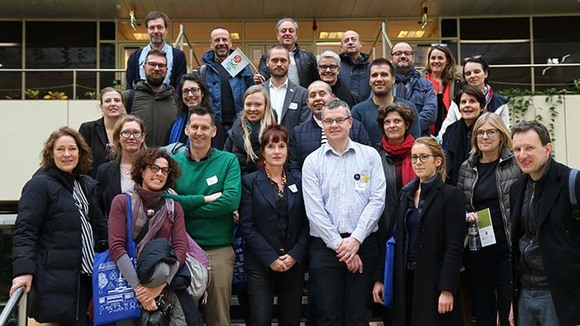
Local partners and international delegates (photo by Sas Amoah)
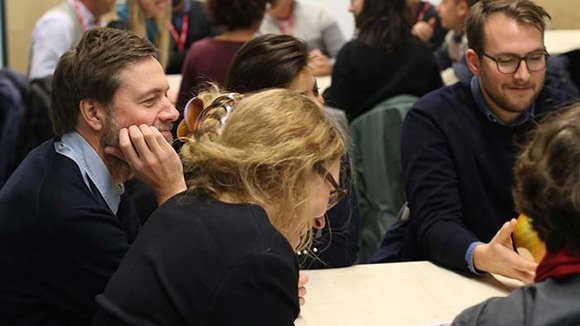
Discussion at Anouar Kassim’s presentation (photo by Sas Amoah)
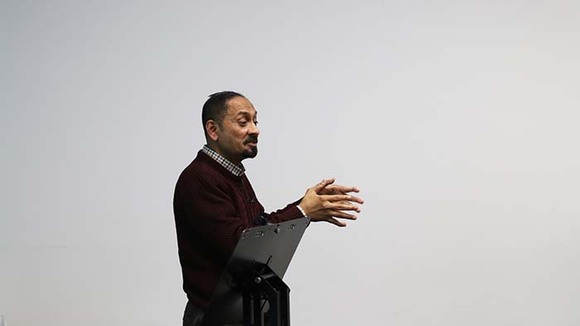
Anouar Kassim presenting the work of the Milton Keynes Islamic Arts and Culture Organization (photo by Sas Amoah)
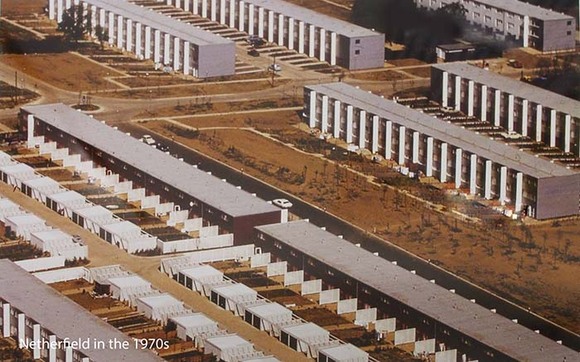
MK neighbourhood of Netherfields in the 1970s (aerial)
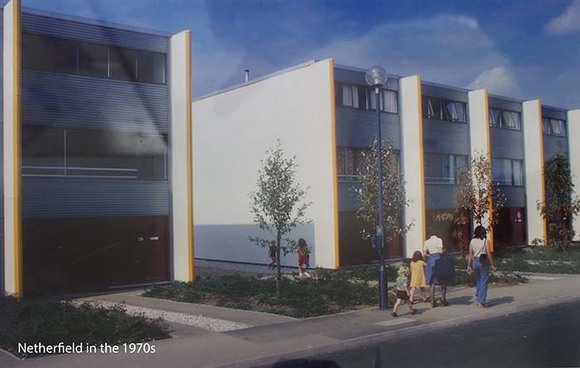
MK neighbourhood of Netherfields in the 1970s (street)
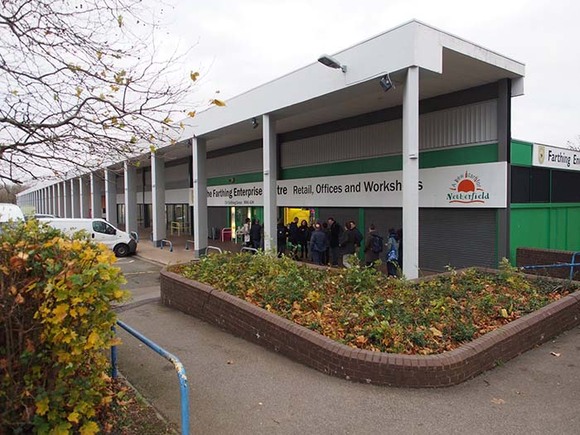
The Local Centre, Netherfield (photo by Isabel Potworowski)
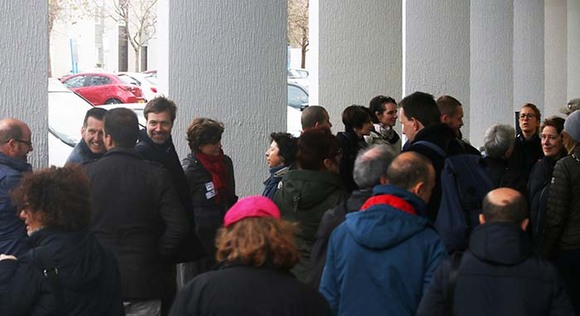
Delegates at the Local Centre, Netherfield (photo by Sas Amoah)
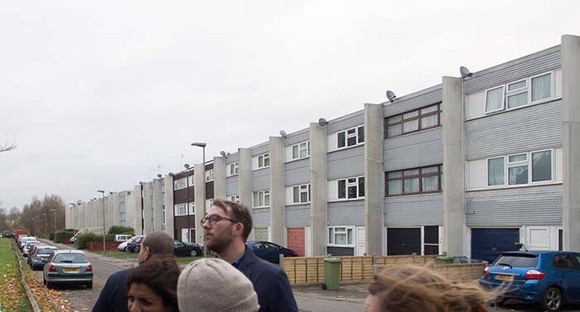
Netherfield (photo by Isabel Potworowski)
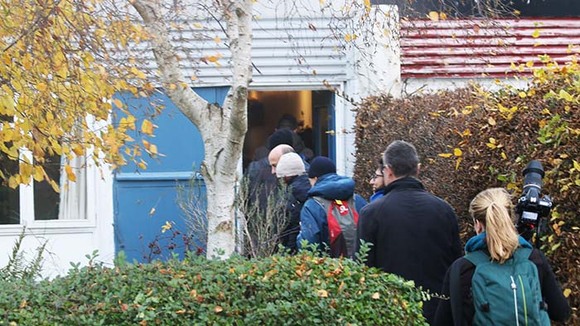
Visit to a courtyard house in Netherfield, led by local architect Simon Jackson (photo by Sas Amoah)
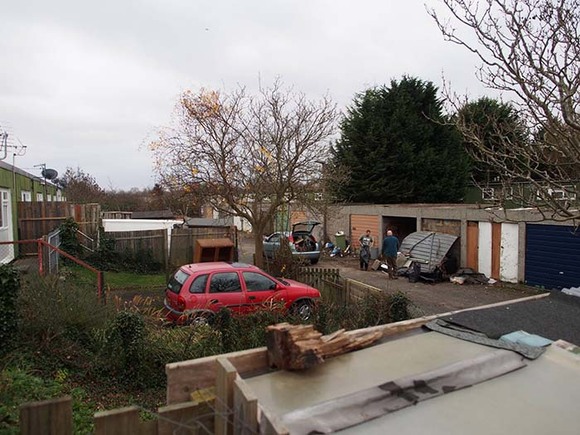
Alley between courtyard houses, Netherfield (photo by Isabel Potworowski)
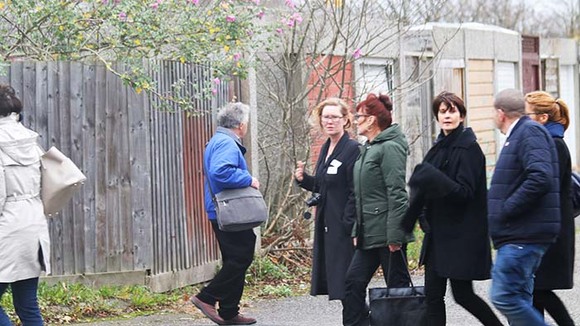
Netherfield (photo by Sas Amoah)
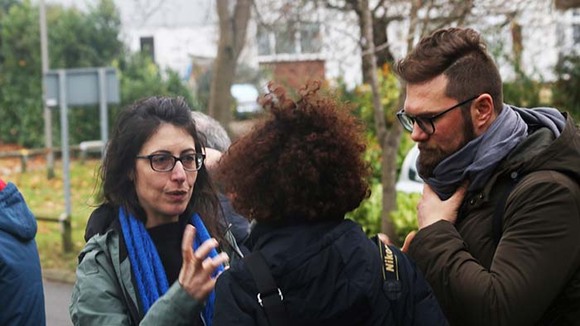
Project leader Viviana Rubbo with Italian partners Dunia Mittner and Sebastiano Roveroni (photo by Sas Amoah)
Artist Jessica Rost presenting her work at the Festive Road workshop in Kiln Farm (photo by Isabel Potworowski)
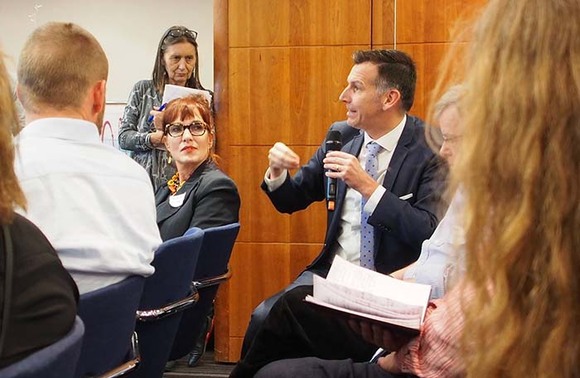
INTI partner Michelle Provoost with Nissewaard delegate Misko Papac during the day 2 panel discussions (photo by Isabel Potworowski)
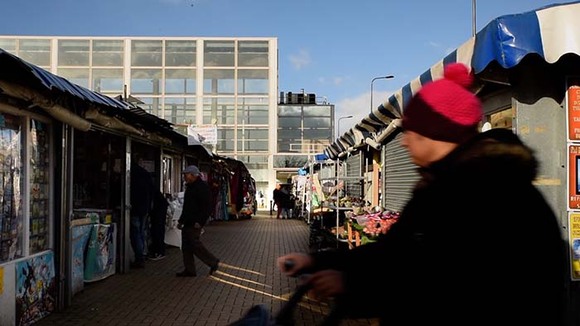
Milton Keynes market, with the modernist Town Centre behind (photo by Marit Geluk)
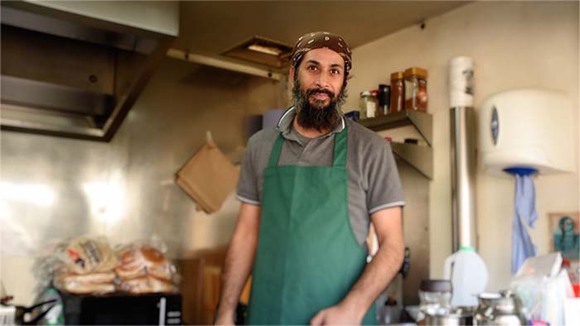
Local shop owner (photo by Marit Geluk)
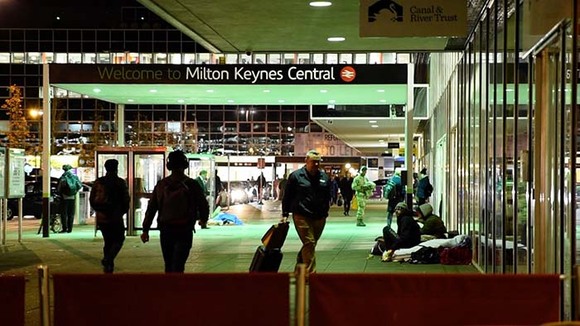
Milton Keynes station (photo by Marit Geluk)
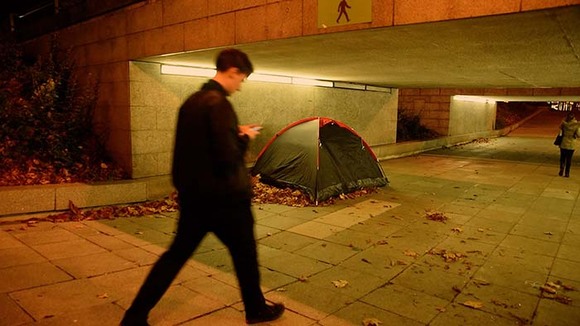
Pedestrian underpass with a homeless person’s tent (photo by Marit Geluk)
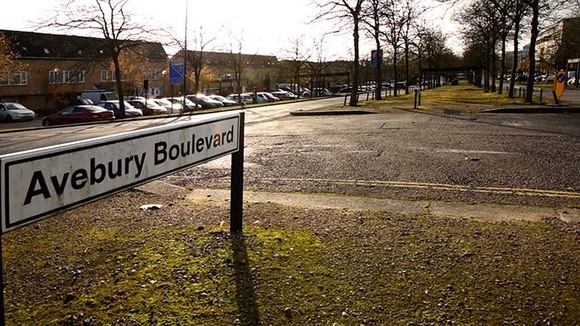
Avebury Boulevard (photo by Marit Geluk)
New Town Lab Milton Keynes
November 23 – Seminar Day
Introduction by Francesca Skelton (Chair of the MK Arts and Heritage Alliance, Moderator for the day)
Introduction by Liz Grifford (Cabinet Member for Place)
Part one: Beginnings
‘Europe for Citizens Project Overview’, presented by Michelle Provoost (Director of the International New Town Institute)
‘Towards 2050 - Milton Keynes: The Cultured and Creative City’, presented by Shane Downer (MK Heritage Officer)
Keynote Presentation: ‘Does a more diverse new city mean a more unsettled city? Milton Keynes since 2000’, presented by Professor Mark Clapson (University of Westminster)
Panel Discussion. Participants: Michelle Provoost, Shane Downer, Mark Clapson, Liz Grifford
Part Two: The Makings of Milton Keynes
‘A City Designed for Migration?’, presented by Will Cousins (Chair of MK Gallery)
‘Personal Stories: Creating the Cultural Ambassadors of the future’, presented by the students of the MK Academy. Introduction by Deborah Gockelen (Director of Business and Enterprise)
‘Reaching newcomers, migrants & refugees through Culture’, presented by Mike Kasibo (Chair and Founder of the Global Outreach Foundation)
Panel Discussion - Participants: Will Cousins, Deborah Gockelen and MK Academy students, Mike Kasibo, Rosaline Stafford (Director of Global Outreach Foundation Milton Keynes - GOF:MK)
Part Three: Placemaking and City Identity
‘Different by Design: Milton Keynes the European Capital of Culture 2023? The role of Identity and Diversity in the draft 2023 Programme’, presented by Fiona Boundy (Public Art Officer, Milton Keynes Council)
‘Plan: MK – building culture and identity into the next Local Plan’, presented by Mike Moore (Senior Planning, Milton Keynes Council)
‘The significance of Milton Keynes’s Design Unique Selling Point – The New Town Heritage Register’, presented by Simon Peart (Conservation and Archaeology Manager, Milton Keynes Council)
‘When New Towns are no longer new, Migration, Identity and Regeneration of the original New Town area’, presented by David Gleeson (Managing Director of Your:MK)
Panel Discussion and conclusion. Participants: Simon Peart, Mike Moore, David Gleeson, Roger Kitchen (Founder of Living Archive), Anouar Kassim (Founder of MK Islamic Arts Heritage and Culture / Community Connects UK), Shane Downer.
The present report is a documentation of the insights related to New Towns and migration from the two-day New Town Lab in Milton Keynes and it should be read within that context. The lab was the first of five events as part of the International New Town Institute’s two-year project “New Towns Arrival Cities”. European New Towns, built by the welfare state to accommodate growing urban populations, all share a social democratic background and planned nature; today, they all face similar challenges as they struggle to adapt to rapidly growing and diversifying populations.
You can download the report here.
Initiatives in Milton Keynes that support the integration of migrant communities

Anouar Kassim (MBE), founder of the Milton Keynes Islamic Arts Culture and Heritage organization (MKIACH) initiated an art project involving immigrant women in Milton Keynes as a way of empowering them and strengthening inter-cultural exchange. A series of workshops were organized where local artists guided a group of migrant women – including Muslim, Sikh, Nigerian, Iranian, Indian, Pakistani and Tamil women – in making quilt patterns. The quilt fragments will be combined into a larger quilt, and displayed in various locations in Milton Keynes. The value of the workshops was above all the discussions that were initiated between the women of various backgrounds: about the challenges of integration in a new place with a new language, about the socio-political and climatic changes that impact migration in their countries of origin, and the value of community and creative exchange.
Click here to view a video about the project.



